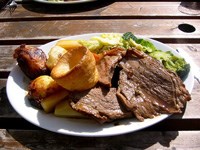
Subscribe & Follow
Jobs
- Marketing Assistant Johannesburg
- Junior Accountant George
- Fraud Analyst Johannesburg
- Vehicle Stock Controller East Rand
- Health and Safety Manager Johannesburg
- Mobile Developer Cape Town
- Head of Digital Johannesburg
- Software Developer Johannesburg
- Warrantee/Costing/Debtors and Creditors Clerk East Rand
- F & I Business Manager Rustenburg
Climate change to affect food prices severely: FAO

The index comes just days after to international agency Oxfam released its report on Monday saying new research showed that the full impact of climate change on future food prices was being underestimated. Oxfam's new report‚ called Extreme Weather and Extreme Prices‚ highlighted for the first time how extreme weather events such as droughts and floods could drive up future food prices. Previous research only tended to consider gradual impacts‚ such as increasing temperatures and changing rainfall patterns.
The Agriculture Business Chamber (Agbiz) in SA said on Thursday that it believed it was not just climate change that held risks‚ but that the increased competition for resources‚ especially energy resources‚ impacted on food prices.
"Demand patterns‚ especially with regard to consumer behaviour‚ are also changing rapidly which further contributes to volatility as supply battles to keep up with demand.
"At issue is how to produce competitively and sustainably in the global agro-food jungle‚ given the highlighted risks‚" said Agbiz in its newsletter.
Index spikes
Presenting the FAO index in Rome‚ Da Silva said the index had spiked 6% in July after three months of decline‚ and that the August index showed that international prices of cereals and oils and fats changed only slightly while sugar prices fell sharply - compensating for rising meat and dairy prices.
Although still high‚ the FAO index currently stood at 25 points below its peak of 238 points in February 2011 and 18 points below its August 2011 level. The FAO food price index is a measure of the monthly change in international prices of a basket of food commodities.
It said global cereal production would not be sufficient to fully cover expected utilisation in 2012/13‚ pointing to a larger drawdown of global cereal stocks than earlier anticipated.
The FAO index said that deteriorating crop prospects for maize in the US and wheat in the Russian Federation had initially underpinned export quotations‚ but prices eased towards the end of August following heavy rains in areas hardest hit by drought in the US‚ and the announcement that the Russian Federation would not impose export restrictions. "Renewed import demand sustained international rice quotations‚" the index noted.
The index averaged 260 points in August‚ the same as in July‚ with some increases in wheat and rice offsetting a slight weakening in maize.
Source: I-Net Bridge

For more than two decades, I-Net Bridge has been one of South Africa’s preferred electronic providers of innovative solutions, data of the highest calibre, reliable platforms and excellent supporting systems. Our products include workstations, web applications and data feeds packaged with in-depth news and powerful analytical tools empowering clients to make meaningful decisions.
We pride ourselves on our wide variety of in-house skills, encompassing multiple platforms and applications. These skills enable us to not only function as a first class facility, but also design, implement and support all our client needs at a level that confirms I-Net Bridge a leader in its field.
Go to: http://www.inet.co.za




